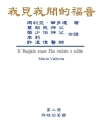In ‘The Temple, ‘ Alfred Edersheim intricately explores the second temple of Jerusalem, delving into its historical, religious, and architectural significance within Jewish tradition. Written in a narrative style imbued with a rich sense of detail, Edersheim’s work serves as both a scholarly examination and a devotional testimony, as he seeks to reconstruct the spiritual and cultural milieu surrounding the temple. Utilizing a blend of biblical exegesis, historical data, and archaeological findings, Edersheim provides readers with a comprehensive overview that situates the temple not merely as a physical structure but as a central symbol of Jewish identity and divine presence. Alfred Edersheim, a Jewish convert to Christianity and a noted biblical scholar of the 19th century, draws upon his extensive theological training and personal background to craft this profound study. His experiences and knowledge of Jewish customs and the scriptural context contribute to the depth of insight and passion evident in his writing. It is through his perspective that modern readers can engage with ancient traditions, rendering the complex layers of temple significance accessible and relevant. For scholars, theologians, and anyone intrigued by the historical and spiritual legacy of the Jewish faith, ‘The Temple’ stands as an indispensable resource. Edersheim’s meticulous research and eloquent prose invite readers to immerse themselves in the sacredness of the temple, encouraging a deeper understanding of its lasting impact on both Jewish and Christian thought.
عن المؤلف
Alfred Edersheim (1825–1889) was a Jewish scholar of great erudition and a notable Christian convert of the 19th century whose scholarly works have left a lasting imprint on biblical studies. Born in Vienna, Austria, Edersheim was reared in a Jewish home and received a traditional Jewish education. His quest for knowledge led him to Christianity, and he was baptized in 1843. Pursuing theological studies, Edersheim was influenced by the Oxford Movement and later followed a ministerial vocation within the Church of England. His works reflect a unique blend of Jewish perspective and Christian scholarship, contributing significantly to the understanding of the Judaic context of the Christian canon. Among his seminal works is ‘The Temple: Its Ministry and Services’ which provides an exhaustive account of the Second Temple period and the practice of religious rituals during that epoch. This book remains a valuable resource for biblical scholars, historians, and anyone interested in the rich tapestry of religious history and practice in the ancient Jewish context. Edersheim’s literary style combines meticulous research with a narrative that makes complex ancient practices accessible, offering readers a vivid portrayal of temple worship and the historical-religious milieu into which Christianity emerged.












